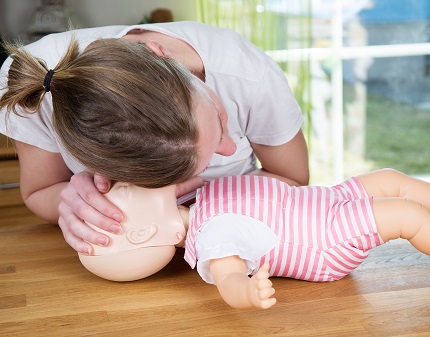Certified CPR & First Aid instructors offer high-quality CPR classes and certification programs in North Carolina.
Not only are there a variety of options within the Raleigh-area, most CPR certification providers will come directly to you. This makes it convenient and easy if you want to provide on-site training for your employees, or simply have a hectic schedule.
Although the general population may view CPR training as something required for medical professionals, childcare providers and educators, the American Heart Association (AHA) recommends everyone become certified, including parents, children, babysitters and home care providers.
The more individuals trained to perform CPR as per the most current standards and recommendations, the more lives will be saved each year.
 AHA-Authorized CPR Certification Programs in North Carolina
AHA-Authorized CPR Certification Programs in North Carolina
Before you sign up for a CPR certification program make sure to select instructors or institutes providing American Heart Association Authorized certifications.
The AHA is the platinum-standard when it comes to the science, medicine, research, and statistics on CPR best-practices and standards. Even reputable agencies such as the Red Cross design their programs in response to AHA latest guidelines.
Whether you’re getting certified for the first time or looking to renew/refresh a current certification, verify your instructor offers AHA-authorized coursework and testing.
Choosing a CPR Certification Program in North Carolina
While anyone can take CPR courses, it’s best to select the one(s) best suited for your needs.
For example, the basic Heartsaver course is ideal for anyone, but health professionals benefit most from targeted training that dives deeper into scenarios they’re most likely to encounter within the medical field.
At CPR Consultants, one of North Carolina’s leading CPR certification institutes, we provide the most popular certification programs. Read on to learn more about these courses.
Heartsaver CPR/AED – Adult Child & Infant
If you’ve never been certified in CPR before, and you don’t work in the healthcare profession, odds are you’ll start here. Heartsaver CPR/AED courses are the 101 Course of the CPR world.
You’ll learn how to recognize a basic, cardiac episode as well as how to perform an assessment, chest compressions and rescue breathing, for the general adult, child and infant populations.
You’re most likely to attend a Heartsaver CPR/AED course if you’re a(n):
- Parent, sibling or family member interested in general CPR knowledge (AHA recommends certifying children ages 9-years old and up)
- Teenager or young adult wanting to boost your babysitter or part-time childcare resume
- Educators or coaches
- Employee whose employer or manager wants/requires staff to have basic CPR knowledge
CPR Consultants offers Heartsaver CPR/AED certification programs in North Carolina on a regular basis.
View class listings, or contact us to learn about corporate CPR course options, which bring the classes to your business or organization of choice.
Heartsaver CPR/AED and First Aid
This course builds on the general Heartsaver coursework by adding basic first-aid to the mix. It serves the same, general population as the regular Heartsaver certification does, but is often required by employers who want clients/customers to have greater confidence in their employees’ abilities.
Those most likely to attend Heartsaver CPR/AED and First Aid courses include:
- Lifeguards
- Health club employees
- Childcare providers at schools, gyms, corporate offices, etc.
- Nannies working for an agency
- Coaches or group leaders (scout leaders, youth group leaders, etc.)
- Company safety managers
View class listings for CPR/AED & First Aid certification options.
BLS for Healthcare Providers
This is where we make the jump from the “general” CPR coursework to more medical-specific education/training.
The Basic Life Saving (BLS) certification was created for those who work in the healthcare field, or who serve a more vulnerable population as a result of their work in hospitals, labs, medical clinics and so on.
In addition to CPR and AED skills, the BLS course goes into scenarios more specific to medical environments. It’s collaborative, group format engages participants in dialogues that encourage problem-solving of authentic scenarios and experiences, including real-life simulations.
The BLS courses are tailored for:
- Nurses, CNAs, NPs
- Physicians and clinicians
- Occupational and physical therapists
- Firefighters, police officers, and correctional officers
- Anyone working in a health-related field or building
View class listings for our BLS for Healthcare Provider courses.
ACLS for Healthcare Providers
Like BLS courses, Advanced Cardiac Life Support (ACLS) classes are designed for those in the healthcare profession. More specifically, this course applies to those who work in situations where patients/clients are more likely to have cardiopulmonary emergencies.
Course instruction does occur, but instructors also work in collaboration with participants. Together they evaluate how solid communication, transparent policies and procedures, and a cooperative work environment facilitate better recognition and effective intervention during a heart-related medical event.
ACLS courses are most sought after by:
- Nurses
- Physicians
- EMTs, Paramedics, and firefighters
- Medical professionals and staff working in ERs, ICUs, Urgent Care facilities and other critical care units
Many healthcare providers and those in related fields obtain both their BLS and ACLS certifications because the two complement, rather than compete, with one another.
Don’t forget that we can bring the courses to your facility or conference room to expedite the process.
View class listings of ACLS training options.
Pediatric Advanced Life Support (PALS)
Again, in compliment to the BLS and ACLS, the AHA-approved CPR certification providers offer Pediatric Advanced Life Support courses.
These classes focus on cardiac events more likely to occur in the pediatric population. Instructor-led courses are delivered in video and group formats, with simulations, that emphasize the importance of positive communication and team dynamics in improving outcomes.
While the courses were created for those in pediatrics, they benefit anyone whose career relates to children/infants.
View class listings of our PALS courses.

